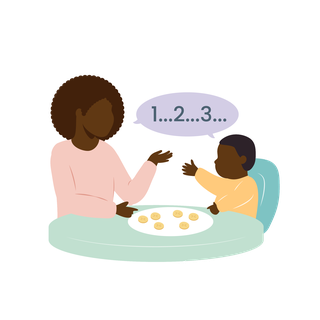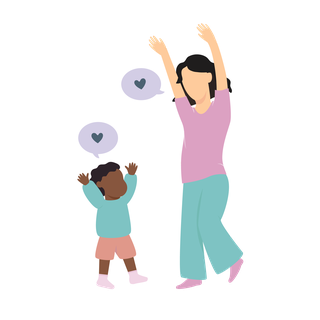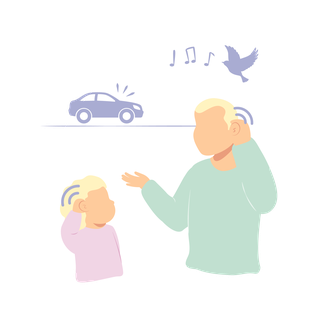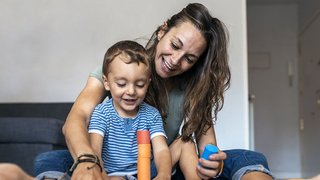Learning conversations and telling stories: 3 to 5 years
Your child will start using longer sentences, like "I want a drink now". Chatting with them and talking about what they're doing can really help them to learn new words and how to have conversations.
Chat about your day together and help your child learn by sharing your day too!
Video: Talk to each other when you're out and about
Watch the dad talk to his daughter about what they see and hear on their journey to the park. He mimics the sounds of what he sees and gets his daughter to join in too.
Activities for your daily routine

Mealtimes
Mealtimes are a great way to spend time with your child and have a chat while you eat.
Along with talking about your day, you can also chat about the food on their plate.
For example, you could count their food as you put it on their plate, like slices of banana: "1, 2, 3 – 3 slices of banana for you. 1, 2, 3 – 3 slices for me. That makes 1, 2, 3, 4, 5, 6 – 6 slices altogether!".
This helps them get familiar with counting, and before long, they might start joining in.
As they get better with numbers, they might even count on their own or say the total right away without counting out loud.
Prepare food together
Letting your child help when preparing food is a fun way for them to learn new words with you.
They can join in by "pouring", "stirring", and "mixing". They might enjoy pressing "start" on the microwave and counting down the numbers on the timer. If you’re measuring ingredients, they can help with counting.
You can also talk about things like needing "more" or "less" of something, or if there’s "too much!".

Storytelling at home
Interactive story time is a fun way to spend time with your child. It helps them learn to talk, express themselves, and move around.
Next time you read a story, try acting out parts of it together. For example, if the book talks about a tree, pretend to be a tree!
Lift your arms and move them like leaves in the wind. Make sure you both have enough space to join in.
Set the scene
You can make the story even more exciting by adding sounds. Try finding music or sounds that match the story, like birds singing or rain falling.
Choose a book they know well
See if your child can help by filling in the parts of the story and telling you what happens next.

Out and about
When you're out and about, listen for all the different sounds around you.
Pay attention to what catches your child’s interest by noticing where they're looking or pointing, even if they don't use words.
You can comment on what they’ve noticed and start a conversation. For example, "That's a loud car! I wonder where it's going" or "That bird is singing in the tree. I think it sounds happy".
Have fun making those sounds together, like "vroom, vroom" or "cheep, cheep".
When you get home, chat about all the things you saw and heard!
Helping your child to listen
When you're out and about, your child might notice different things to you. Pay attention to what grabs their interest, and you can join in and explore their world together!
Sometimes, you might want to show them something new. To help them focus on it, try pointing it out and saying something like, "Listen, I can hear the ducks quacking" (while pointing to the pond).
Video: Read and talk about books together
Watch a mum being led by the child’s book interests during reading time. She reads familiar books so her son can anticipate what's coming next.
Tiny Happy People
The BBC’s Tiny Happy People website offers simple, expert-backed ideas and activities to support your child’s language and communication skills from pregnancy through their early years.
The tips are easy to add to your daily routine, quick, inspiring, and proven to help your child thrive.

Little tips for everyday play
Libraries are a free way to access age appropriate books. Some also run story time sessions for parents and their children. Find your local library service on gov.uk.
Your local council may offer activities too. Find learning activities for your child on gov.uk.
Family Hubs
Family Hubs offer support to children, young people and their families. They provide a single place to go for support and information from a variety of organisations, making it easier to get the support you need.
They can provide guidance on issues such as feeding your baby or toddler, mental health and parenting support.
Family Hubs are currently operating in 75 local authorities across England.
Learning more than 1 language
It's important to chat with your child in the language or languages you speak at home. For tips on how to do this, check out the National Literacy Trust website.
Help and advice
If your child is in nursery, the nursery will continue to review their development. When your child goes to school, your health visitor will inform the school nursing team about any extra support they're having.
If your child needs extra support, your health visitor or the school nurse can help. They may put you in touch with a speech and language therapist and you may also be offered support.
Ask your health visitor for support whenever you need it, they will be able to provide tips and advice.
Remember, children learn to talk at different ages. If you are worried, speak to your health visitor or nursery key worker. Or contact your local speech and language therapy service for advice.
For more ideas on how you can help your child, visit:

Early learning and development
90% of your child's brain growth takes place before they turn 5. Discover more advice and activities for ages 0 to 5 to help you make the most of every moment.
